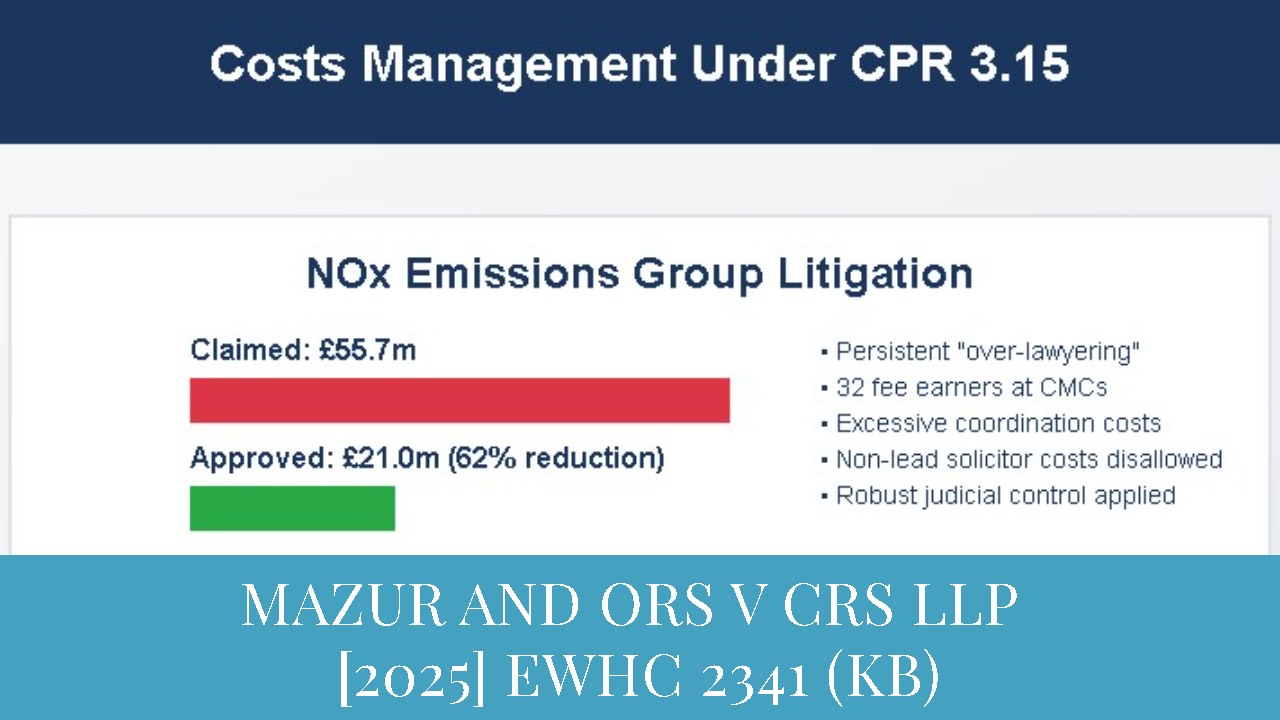The decision in Long v Value Properties Ltd & Anor [2014] EWHC 2981 (Ch) establishes that a short delay in serving additional liability information during detailed assessment proceedings constitutes neither a serious nor significant breach. Paying parties who exploit such oversights rather than cooperating to remedy them engage in opportunistic conduct that detailed assessment and CPR 3.9 applications appropriately condemn, as established in Denton v TH White Ltd
Background
The dispute originated in approximately 2011 concerning the use of parking spaces adjoining property where the claimant, Norah Christina Long, and her late husband were lessees. The claimant’s solicitors informed the defendants, Value Properties Limited and Ocean Trade Limited, that the claimant was represented under a conditional fee agreement dated 12 October 2011 with a success fee [§2]. A notice of funding (N251) was served on the defendants in accordance with the Civil Procedure Rules [§2]. Proceedings were issued on 7 February 2013 [§3]. Following the death of the claimant’s husband, the claim continued in her name alone [§3]. The matter was settled by a consent order made on 15 August 2013, which required the defendants to pay the claimant’s costs, to be subject to detailed assessment on a standard basis if not agreed [§3].
The success fees of counsel and solicitors together totaled £48,462, forming part of a total bill of £131,937 [§8].
Detailed assessment proceedings were commenced on 17 October 2013 when the claimant’s solicitors served the notice of commencement (Form N252) and the bill of costs, as required by CPR r.47.6(1) [§4]. However, the claimant’s solicitors failed to serve the Further Information, comprising a statement of reasons for the percentage increase or a copy of the risk assessment, and a copy of the conditional fee agreement itself, as mandated by Practice Direction 47PD.32.5(1)(c) and (d) and 47PD.32.7 [§5].
On 5 November 2013, the second defendant requested a 14-day extension to serve points of dispute, and on 6 November the claimant agreed to extend time for both defendants [§6]. Points of dispute were filed on 14 November 2013 [§6]. These points of dispute raised, for the first time, the claimant’s non-compliance with 47PD.32 [§6-7]. The claimant served the Further Information on 22 November 2013 [§7] and issued an application for relief from sanctions on 28 November 2013 [§7].
The application was heard by Costs Judge Master Rowley on 13 January 2014. Master Rowley expressed “qualms” about the ease with which a breach of this requirement could occur compared with the draconian nature of the sanction, and noted the difference between this situation and the less severe sanctions for failure to serve notice of funding (N251) [§14]. Nevertheless, he found a breach of the CPR, applied the sanction under CPR r.44.3B(1)(d), and refused relief [§9]. Permission to appeal was granted [§9].
Costs Issues Before the Court | Opportunistic Conduct and CPR 3.9
The appeal raised three principal costs issues [§16]. First, whether the claimant had breached the CPR by failing to serve the Further Information at the commencement of the detailed assessment proceedings. Second, if a breach had occurred, what was the applicable sanction under the CPR, particularly whether it fell under CPR r.44.3B(1)(c) or (d). Third, if the more severe sanction under r.44.3B(1)(d) applied, whether relief from that sanction should be granted pursuant to CPR r.3.9.
Significantly, the appeal was heard before the Court of Appeal’s decision in Denton v WH White Ltd [§1], but both parties subsequently provided written submissions on the effect of that judgment in the context of the appeal [§1, §56].
The Parties’ Positions on Relief From Sanctions and Opportunistic Conduct
The claimant argued that there was no breach of the CPR because the rules did not explicitly require the Further Information to be served at the commencement of detailed assessment proceedings; it could be served at any time during the proceedings [§36]. In the alternative, if a breach was found, the applicable sanction was under CPR r.44.3B(1)(c), which imposed a graduated disallowance for the period of default, rather than the “all or nothing” sanction under r.44.3B(1)(d) [§42-44]. The claimant further submitted that, even if r.44.3B(1)(d) applied, the breach was trivial or, in all circumstances, relief should be granted under CPR r.3.9 [§55]. The claimant relied on the lack of prejudice to the defendants, the prompt rectification of the omission, and the defendants’ opportunistic conduct in not notifying the claimant of the oversight earlier [§7, §68-70].
The defendants contended that the Further Information was required to be served at the commencement of detailed assessment proceedings by necessary implication from the structure of the CPR and Practice Direction [§26-31]. They argued that the applicable sanction was under CPR r.44.3B(1)(d), as the breach related to a failure to disclose reasons for the percentage increase [§42]. The defendants submitted that the breach was serious and significant, caused by an oversight which was not a good reason, and that relief should be refused to enforce compliance with rules and practice directions [§67]. They emphasised the tight timetable for points of dispute and the prejudice caused by having to amend them [§67].
The Court’s Decision
The court held that there was a breach of the CPR [§37-40]. It found that the obligation to serve the Further Information at the commencement of detailed assessment proceedings was implied from the interaction of CPR r.47.6, r.47.9, and Practice Direction 47PD.32 [§37-39]. This interpretation was necessary to ensure the efficiency and fairness of the assessment process, aligning with the overriding objective under CPR r.1.2 [§40]. The court referenced Middleton v Vosper Thorneycroft (UK) Ltd [§30-31] and Light On Line Ltd v Zumtobel Lighting Ltd [§32-33] in support of this conclusion.
On the applicable sanction, the court determined that CPR r.44.3B(1)(c) applied, not r.44.3B(1)(d) [§54]. The wording of r.44.3B(1)(c) addressed failures to provide information “by the time required”, imposing a graduated sanction for the period of default, whereas r.44.3B(1)(d) was intended for complete failures to disclose [§42-54]. This interpretation avoided anomalies and better served the overriding objective, particularly given the disproportionate nature of the sanction under r.44.3B(1)(d) for minor delays [§53-54].
In the alternative, if r.44.3B(1)(d) applied, the court found that relief from sanctions should be granted under CPR r.3.9 [§55-74]. Applying the three-stage Denton guidance [§57-66], the breach was neither serious nor significant [§71]. The delay of approximately three weeks was short [§67], rectified promptly once brought to the claimant’s attention [§13, §68], and caused no substantial prejudice [§13, §70].
Critically, the defendants had contributed to the length of the default by seeking an extension for service of points of dispute without notifying the claimant of the omission [§68]. The court found it unclear whether the defendants knew of the breach when the second defendant sought the extension on 5 November 2013, though they were certainly aware by 14 November when they served points of dispute [§68]. Had the defendants wished to shorten the length of default and save costs, they could have informed the claimant before preparing points of dispute and sought an extension to take stock of the Further Information when supplied – the claimant would have agreed to such a request [§68].
Instead, the defendants “preferred to take advantage of the claimant’s oversight by choosing not to inform the claimant earlier, and going ahead with service of points of dispute (after obtaining an extension of time for that purpose) which they knew would require amendment once the Further Information was received” [§69]. Thereafter they declined to cooperate with the claimant and were unwilling to amend the points of dispute to avoid the need for an application for relief [§69].
The court concluded that “in so far as there has been unnecessary cost, delay and use of the court’s finite resources in hearing the application for relief from sanctions and this appeal, this is the result of what in my view was the unreasonable, opportunistic and non-cooperative approach of the defendants to the claimant’s unfortunate oversight” [§70].
The judge found that when looked at in its context, “the breach here is properly regarded as ‘insignificant’ and therefore ‘trivial’ as those expressions are understood in the light of the guidance in Mitchell… For the same reasons I consider the breach to be neither serious nor significant in the terms of the Denton guidance” [§71]. The judge noted that Master Rowley “appears to have fallen into the error by attaching insufficient weight to the circumstances surrounding the breach as well as to the absence of any significant prejudice of any kind to anyone” [§71].
Master Rowley had also fallen into the error identified by the Majority in Denton, in that having concluded the breach was not trivial and that there was no good reason for it, he regarded the application for relief from sanctions as bound to fail, without going on to consider whether that was the appropriate outcome in “all the circumstances of the case” as required by r.3.9 [§72].
Considering all circumstances, including the nature and effect of the breach, the defendants’ conduct, the speed with which the claimant remedied the default and applied for relief, and the need to enforce compliance with rules, practice directions and orders, the just disposal of the application required complete relief from the sanction to be granted [§73].
The court added that “the defendants’ behaviour here has been precisely the kind of opportunistic, and non-cooperative conduct in litigation condemned by the Court of Appeal in Denton” [§76]. Had the defendants taken a different course, “the matter could probably have been completely resolved within the overall period of the extension of time which they applied for and were granted by the claimant, or very soon thereafter. This would have saved the parties and the court the time and expense of a lengthy hearing before the Judge and an even longer appeal hearing” [§76].
The appeal was allowed on both grounds [§75].
Setting Aside Default Costs Certificate – Denton Criteria Applied
Directly discusses Denton three-stage test for CPR 3.9 applications in detailed assessment context
Defendants Fail To Have US$3.7m Default Costs Certificate Set Aside
Application of Denton guidance to detailed assessment procedural breaches with CPR 47.12 analysis
CPR 3.14 | Late Costs Budget | Relief From Sanctions Denied
CPR 3.9 sanctions where court found persistent failure to engage – contrasts with relief granted for minor oversight
No Excuses: Relief From Sanctions Refused Following Late Filing
High Court applies CPR 3.9 refusing relief where breach serious and significant with no good reason
CPR 52.18: Applications To Set Aside Permission – Mitchell and Denton Principles
Court of Appeal confirms Mitchell strict approach – discusses sanctions regime that Denton sought to moderate
Retrospective CFAs and Success Fees in Detailed Assessment
Additional liability disclosure requirements and reasonableness of success fees








![FERNANDEZ V FERNANDEZ [2025] EWHC 2530 (Ch)](https://tmclegal.co.uk/wp-content/uploads/2025/10/YT-Thumb-1.jpg)




![FERNANDEZ V FERNANDEZ [2025] EWHC 2373 (Ch)](https://tmclegal.co.uk/wp-content/uploads/2025/09/Willis-Title-copy-copy-copy-copy-6.jpg)


![STOCKLER AND ANOTHER V THE CORPORATION OF THE HALL OF ARTS AND SCIENCES [2025] EWHC 2262 (SCCO)](https://tmclegal.co.uk/wp-content/uploads/2025/09/YT-Thumb-300x169.webp)










